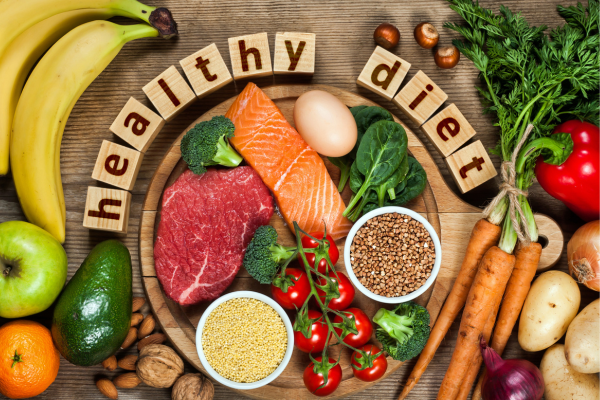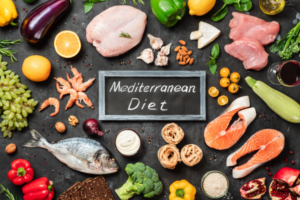
Food for Thought: The Connection Between Nutrition and Mental Health
- Entertainment
- January 5, 2024
- No Comment
- 95
In our fast-paced world, where stress and anxiety often seem like constant companions, it’s essential to explore every avenue for improving our mental well-being. While we’re quick to turn to therapy, medication, or mindfulness practices, we often overlook the profound impact that our diet can have on our mental health. This blog delves deep into the connection between nutrition and mental health, uncovering the secrets to a happier mind.
Understanding the Mind-Gut Connection
To comprehend the relationship between nutrition and mental health, it’s crucial to understand the intricate connection between the gut and the brain. The gut-brain axis is a bidirectional communication system, where signals travel back and forth between these two vital organs.
The gut is home to trillions of microorganisms collectively known as the gut microbiome. This microbiome plays a pivotal role in regulating various physiological functions, including digestion and the production of essential neurotransmitters like serotonin and dopamine. These neurotransmitters are crucial for mood regulation, and their production can be influenced by the foods we consume.
Key Nutrients for a Happier Mind
- Omega-3 Fatty Acids: These essential fatty acids, found in fatty fish like salmon and walnuts, are known to reduce inflammation in the body and promote the production of serotonin, a neurotransmitter associated with feelings of happiness and well-being.
- Antioxidants: Fruits and vegetables rich in antioxidants, such as blueberries, kale, and spinach, protect the brain from oxidative stress and inflammation, potentially reducing the risk of mood disorders.
- Complex Carbohydrates: Whole grains like brown rice and quinoa provide a steady source of energy and help stabilize blood sugar levels, preventing mood swings and irritability.
- Probiotics: Fermented foods like yogurt, kefir, and sauerkraut are packed with probiotics that support a healthy gut microbiome, potentially improving mood and reducing symptoms of anxiety and depression.
- Vitamins and Minerals: Nutrients like B vitamins, vitamin D, and magnesium play crucial roles in mental health. Leafy greens, fortified cereals, and nuts are excellent sources of these essential vitamins and minerals.
- Amino Acids: Protein-rich foods contain amino acids, which are the building blocks of neurotransmitters. Incorporating lean proteins like chicken, turkey, and tofu into your diet can help maintain optimal brain function.

The Gut Microbiome and Mental Health
Emerging research suggests that the gut microbiome may play a significant role in mental health. An imbalance in gut bacteria, known as dysbiosis, has been linked to conditions such as depression, anxiety, and even autism spectrum disorders.
Probiotics and prebiotics (non-digestible fibers that feed beneficial gut bacteria) are being explored as potential interventions to improve mental well-being. Consuming foods like yogurt, kefir, and fiber-rich vegetables can help nurture a healthy gut microbiome, possibly leading to improved mood and reduced anxiety.
The Impact of Sugar and Processed Foods
While some foods can enhance mental health, others can have detrimental effects. High-sugar and processed foods are known to cause rapid spikes and crashes in blood sugar levels, leading to mood swings, irritability, and fatigue. Excess sugar consumption has also been associated with an increased risk of depression.
By reducing the intake of sugary and highly processed foods and opting for whole, nutrient-dense alternatives, you can maintain stable blood sugar levels and promote better mental health.
The Mediterranean Diet: A Mental Health Superstar
One dietary pattern that consistently stands out as beneficial for mental health is the Mediterranean diet. This diet is rich in fruits, vegetables, whole grains, lean protein, and healthy fats like olive oil and nuts. Studies have shown that adhering to the Mediterranean diet can reduce the risk of depression and promote overall well-being.

Expert Tips for a Brain-Boosting Diet
- Balance Your Macronutrients: Ensure your diet includes a balance of carbohydrates, proteins, and fats to provide a steady source of energy throughout the day.
- Stay Hydrated: Dehydration can lead to cognitive impairment and mood disturbances. Drink plenty of water to keep your brain functioning optimally.
- Moderation is Key: While nutrient-rich foods are essential, it’s also crucial to allow yourself occasional treats. A healthy relationship with food includes enjoying indulgent items in moderation.
- Mindful Eating: Pay attention to your body’s hunger and fullness cues. Eating mindfully can help you make better food choices and prevent overeating.
- Limit Caffeine and Alcohol: Excessive caffeine and alcohol consumption can disrupt sleep patterns and contribute to mood swings. Consume them in moderation.
Conclusion: Nourishing Your Mind for a Happier Life
In the quest for better mental health, don’t overlook the power of your plate. Nutrition and mental health are intrinsically linked, and making conscious choices about what you eat can have a profound impact on your mood, cognitive function, and overall well-being.
By incorporating brain-boosting foods, nurturing a healthy gut microbiome, and making informed dietary choices, you can take significant steps toward a happier, more balanced life. Remember, your mind and body are interconnected, and what you eat plays a pivotal role in shaping your mental health. So, savor each bite as you nourish your mind and feed your soul.






